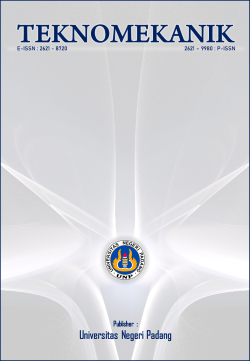The effectiveness of the product-based learning model corresponding to Indonesian national standard competency (SKKNI) for the furniture industry in learning applications of wood construction
DOI:
https://doi.org/10.24036/jptk.v5i3.29123Keywords:
Learning Model, Product Based Learning, Wood Work PracticeAbstract
The industrial revolution era has significantly impacted Indonesian education's development. Education is not only monotonous to study students but also provides opportunities to develop themselves according to their interests and talents. In this lecture, students' practicum products usually only become waste and are not yet suitable for use and even worth selling. The researcher plans to develop a Wood Construction Application learning with a product-based learning approach combined with SKKNI no. 61 of 2021, the wood furniture industry standard. This research is essential to find the most suitable strategy or practice in the Wood Construction Applications lecture. This study aims to develop learning based on the wood furniture industry with a product-based learning approach. The type of research used is research and development with the ADDIE model. The targeted outputs are in the form of books. The experimental and control classes' results of the pretest and post-test obtained an average result of pretest 20 and post-test of 93.31. In the control class, the average results of the pretest were 22.5, and the post-test was 73.38. While the results of the N-Gain value in the experimental and control classes, the experimental class obtained a value of 0.92 with a high category. In the control class, a score of 0.65 is included in the medium category.
Downloads
References
Yori, Akbar Rizki. 2017. Analisis Faktor-faktor yang mempengaruhi Produksi Industri Furniture Kaca dan Alumunium di Kota Pekanbaru. Jurnal Online Mahasiswa Fakultas Ekonomi Universitas Riau. Vol. 4, No. 1, Hal. 434-444.
Arikunto, Suharsimi. 2010. Prosedur Penelitian Suatu Pendidikan Praktik. Jakarta: Rineka Cipta
Apitasari, Minung, dkk. 2015. Effect Of The Quality Of Service and Location Of Consumer Decision To Use The Service FotoCopy Simongan. Jurnal Of Management Semarang. Vol 1.1 No.7.
Sugiyono. 2017. Metode Penelitian Kuantitatif, Kualitatif, dan R&D. Bandung: Alfabeta, CV.
Amalia, Yana Dirza, dkk. 2014. Pengaruh Penerapan LKS Berorientasi Pembelajaran Berbasis Masalah Terhadap Kompetensi Siswa Kelas X SMA Negeri 1 Gunung Talang. Pillar Of Physics Education.
Hamzah, Ali. 2014. Evaluasi Pembelajaran Matematika. Jakarta: PT Raja Grafindo Persad.
Daryanto. 2010. Evaluasi Pendidikan. Jakarta: Rineka Cipta.
Sundayana, Rostina. (2014). Statistika Penelitian Pendidikan. Bandung: Alfabeta.
Sundayana, Rostina. 2012. Pengaruh Perkuliahan Statistika Berbantuan Ms. Excel dan SPSS dengan Model Pembelajaran Tutorial Terhadap Kemampuan Pemecahan Masalah dan Komunikasi Matematis. Universitas Pendidikan Indonesia.
Downloads
Published
How to Cite
Issue
Section
License
Copyright (c) 2022 Ari Syaiful R.A, Fani Keprila Prima, Yuwalitas Gusmareta, Sukma Yudistira

This work is licensed under a Creative Commons Attribution 4.0 International License.





